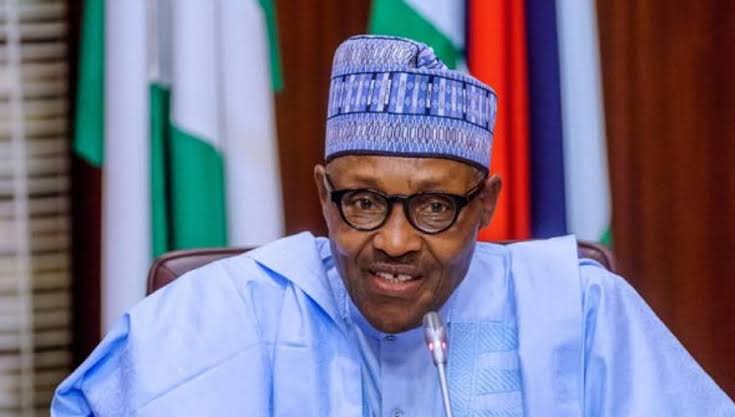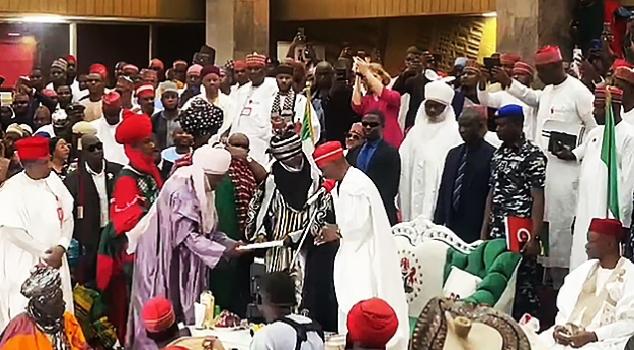News
OPINION: NIGERIA’S UNCHANGED STATUS AS CURRENT WORLD CAPITAL OF POVERTY – A SHAME ON NIGERIA’S GOVERNMENT

By Zik Gbemre
It is no news that the issue of poverty in Nigeria, has become a ‘political tool and weapon’ used by the political class to exploit the people, so as to have their way in gaining access to power and remaining in that circle. As such, we have seen successive Nigerian Governments and politicians using the issue of poverty to make promises, enact bills and policies which often times, are nothing but words on paper that are never brought into reality. What is even sadder is the fact that, rather than the situation to change or become better, it is getting worse by the day. Yet, our Nigerian politicians, whom have continued to live in affluence, splendor and waste of public wealth, keep telling the people that they are making efforts to eradicate poverty in the land.
In a well circulated short video by RootsTv Nigeria online, this situation was well presented. It noted that: “We cannot shy away from reality, or remain unconcerned about the devastating effect of poverty in Nigeria. The root of poverty lies in the deprivation of peoples’ access to necessities such as food, healthcare, and sanitation, education to say the least. The scars stare us in the face. Poverty surrounds us. More glaring in the suburbs of the Federal Capital Territory Abuja. It is no news that Nigeria has overtaken India, and is currently the capital of poverty in the world.” With more than 70% of its population living on less than $2 a day. And we are certain that this figure must have increased in the face of the Coronavirus (Covid-19) Pandemic, which has brought with it an unprecedented lockdown that has further crippled the livelihoods of many Nigerians whose daily bread are gotten from daily hustle.
“What perhaps is news, is that Nigeria’s poverty statistics, instead of diminishing, is increasing day by day. According to the National Bureau of Statistics (NBS), the number of people living in extreme poverty in Nigeria as of April 2019, was 91,501,377. Making Nigeria the poverty capital of the world. As if that was not bad enough, 6 months later, the number jumped to its current count of 94,470,533 people in extreme poverty. What this means is that (we have added) 2,969,158 people, have entered into extreme poverty within 6 months. By comparism, this number is more than the entire population of the Gambia and Cape Verde combined. The logical question in the light of the above is that, how can Nigeria be lifted out of poverty. To Nigerian Government, they have promised, as usual, to lift 100m Nigerians out of poverty over the next 10 years and set them on the path to prosperity.” But if we are to be real and truthful with ourselves as a people, we would agree with the fact that this is another “Plan On Paper Without The Will To Execute Same” – as there are evidently nothing concrete and sustainable on ground by the current administrations at all levels to make this a reality within the said 10years. President Buhari even promises poverty eradication by 2023. All of this, are nothing but ‘political statements’ and propaganda, which has become a trademark of Nigerian Politicians at all levels.
According to Fumilayo Oyefrusi, of ActionAid: “For us, Recurrent Expenditure means you are just paying salaries and you are not doing anything. So, where are the projects that the people are supposed to be working on to be able to earn that salary? So, right now, that budget (referring to Nigeria’s 2020) needs to be looked into. I hope the National Assembly will do this and increase the amount on Capital Expenditure because as citizens, we need to concentrate on just Two – the roads and power supply. This Two will go a long way.”
“President has promised to lift 100m out of poverty by the end of his second tenure, but Nigerians hope that this will not be their usual rhetoric. lifting 100m Nigerians out of poverty is just a convenient catch phrase to give the impression that the Nigerian Government is doing something – as they joined the rest of the world on the International Day For The Eradication of Poverty some months ago. The fear however is heightened, as the current rate in Nigeria is not only off the track to meet the Sustainable Development Goals, but many now believe that the 25% of the world’s extreme poor, will live in Nigeria by 2030. The high rate of poverty in Nigeria has been attributed to the unprecedented level of Corruption in Government, and largely affecting all spheres of society. Many believe the President has not done enough. In the words of Emmanuel Onwubiko, Chief Operating Officer of Human Rights Writers Association of Nigeria (HURIWA): “There are no evidential proof to show that this Government is committed to eradicating poverty. Rather, the Government is complicating and compounding our poverty situation by going and borrowing. Nigeria has become a Debtor nation. Nigerian is all over the place, with a cup in hand, going everywhere begging from unconceivable creditors all over the place, including China and the rest of them.”
“Over the years, the following factors have largely contributed to the high rate of poverty in the country. These include corruption, lack of education, poor medical care, unfair distribution of material resources amongst others…” Chipping in the words of Fumilayo Oyefrusi: “So, why do the Nigerian Government want to increase tax on the people that are already there without basic amenities? And further impoverish the entire nation. If the Government is broke, let them come out and tell us that they are broke, and find other ways to fund the budget. Again, we are also doing debt management, paying huge amounts on it. We need to look at other sources of making money. Other sources of collecting these taxes, and not from the common man that is already paying excessively.”
One of the most notable features of the development experience during the past fifty years is that poverty in developing countries like Nigeria remains widespread. One quarter of the world’s people continue to live in extreme poverty, unable to meet their most basic needs, and surviving on less than a dollar a day, the World Bank’s international poverty line. Over one hundred million children of school age are denied the right to a basic education, and in sub-Saharan Africa the absolute and proportionate number of children out of school is rising. Each year, half a million women die in child birth because they have no access to simple and affordable ante-natal health care. Every week, close to a quarter of a million children under the age of five die from malnutrition, malaria, measles and other easily preventable diseases. Using poverty indicators such as literacy level, access to safe water, nutrition, infant and maternal mortality, and the number of people living on less than $1 a day, Nigeria is found to rank among the 25 poorest nations in the world below Kenya, Ghana and Zambia (World Bank Report). This is in spite of all the efforts and resources devoted for many years to fighting poverty by successive governments in Nigeria, with the support of richer nations and international development institutions. These unsatisfactory results call for a re-examination of policies and practices of poverty eradication in Nigeria.
This was how the Senate had passed for third reading some months ago, a bill for the establishment of a National Poverty Eradication Commission (NPEC), which, according to them, would provide legal and regulatory framework for policies and programmes of government aimed at eradicating poverty in Nigeria. But we noted that the said NPEC is not what we need to eradicate poverty in Nigeria. As far as we are concerned, the establishment of a National Poverty Eradication Commission will only create ‘political appointments’ and juicy contracts/jobs for politicians, and at the end of the day, practically nothing will come forth from the said NPEC and the lives and standard of living of the Nigerian common masses will not be better off. So, rather than start chasing shadows and wasting scarce public funds and time, the National Assembly, and the various Governments at all levels should do the needful by creating the conducive atmosphere/environment for ‘private-sector-driven-industrial growth’ – which will spur economic growth and would tremendously reduce the poverty in the land.
Though, they noted that the previous initiatives such as the National Poverty Eradication Programme (NAPEP) and Subsidy Re-investment and Empowerment Programme (SURE-P), failed because they lacked legal and regulatory framework, and that said NPEC bill would strengthen the efforts towards eradicating poverty in the country. However, the fact still remains that it is not wise for members of the National Assembly to think that they can address the overwhelming poverty in the country by setting up a Commission, without the Government at all levels plying their part in providing the needed environment for poverty to be eradicated. The Government at all levels and our lawmakers have to show some element of seriousness, by addressing pressing decayed and non-existing basic amenities and infrastructure issues, insecurity issues – all of which would attract industrial growth – which are the key things that brings about all-round development and improved standard of living for any nation. Without industrial growth, we are simply wasting our time, energy and resource if we think we can eradicate poverty by merely establishing a Commission.
Let us bear in mind that successive regimes in Nigeria have tried different policies and programmers geared towards reducing the level of poverty in the society through a number of ways. First, through the activities of its Ministries/Agencies; second, by collaborating with International Agencies; third, and more importantly, through the establishment of Agencies/Commissions equipped solely to fight rising poverty and unemployment in Nigeria. In fact, the Joda Panel, established at the inception of the civilian administration of Obasanjo that reviewed the “various poverty eradication programmers of the previous regimes”, identified over twenty such institutions. Time and space will not allow us to list all of them here. But the point we are driving at, is that the establishment of the above stated Commissions, will not address the poverty problem in Nigeria. It is simply an avenue for political appointments and for juicy contract programmes to be awarded and executed with little or no results that would positively impact the lives of Nigerians. Experts have noted that the main causes of poverty in Nigeria are unemployment, ignorance, poor governance, corruption, high inflation, environmental degradation, high population growth, among others. The question is what is the Nigerian Government and the lawmakers doing to address these issues if they really want to eradicate poverty in the land?
There is no purpose-driven Government which wants to leave a lasting legacy that will outlive them and greatly impact its citizenry, that will not focus on ensuring security and massive basic infrastructure for its economy to grow. Even the United States of America (US), as highly developed as they are, is still investing heavily in these areas to sustain their economic growth and continue to be an attraction to foreigners and investors across the world. “Investing in infrastructure makes tremendous sense, both because it creates jobs that pay above median wages and because it improves overall productivity, which leads to higher incomes across the broader economy,” said Jake Sullivan, a Senior policy adviser in the US. Now, if US could be thinking and planning in these lines despite the fact that the US is obviously developed in every standard, how much more the Government of Nigeria that is still underdeveloped.
Zik Gbemre.
*We Mobilize Others To Fight For Individual Causes As If Those Were Our Causes*



